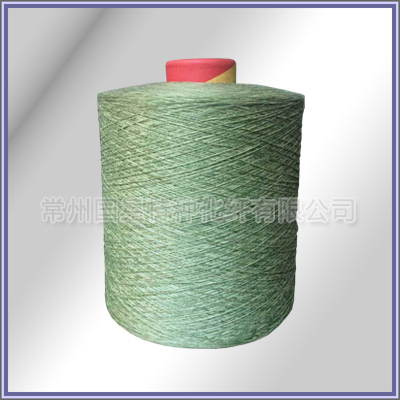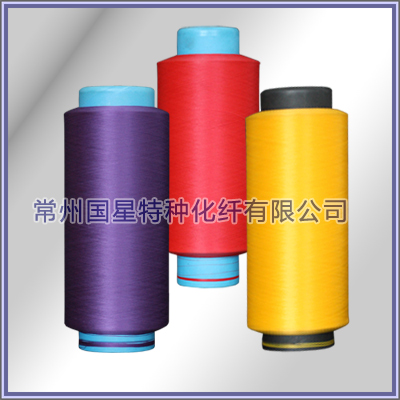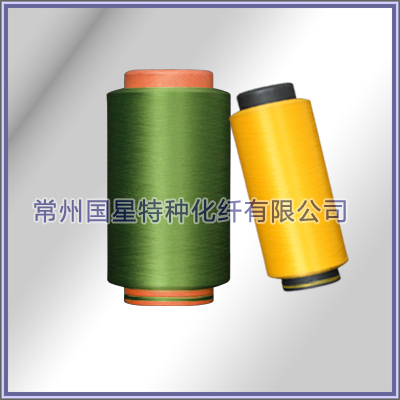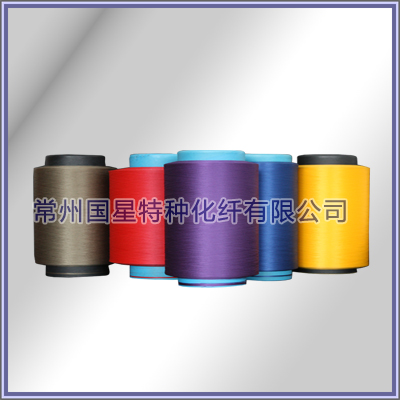The report of the 19th National Congress of the CPC put forth the proposal of "accelerating the building of a powerful nation, accelerating the development of advanced manufacturing industries and promoting the in-depth integration of the Internet, big data, artificial intelligence and the real economy." As the real economy at the present stage of intelligent manufacturing level of the textile industry? In the Internet of things technology, intelligent manufacturing technology innovation and application of what? Countries, industries to promote intelligent manufacturing what measures?
With these questions, the reporter walked into China's textile networking and intelligent manufacturing conference held on December 15 in Taian, Shandong.
Cao Xuejun, Deputy Director of Consumer Goods Industry Department of MIIT, Ye Meng, Director of Equipment Industry Division, Long Ruilong, Deputy Director of Consumer Goods Industry Division, Academician of Chinese Academy of Engineering, Yu Jianyong, Professor of Donghua University, Liu Haitao, Chief Scientist of 973 National Internet of Things, Li Sha, deputy director of Provincial Economic and Information Commission, Xu Hong, director of Shandong Provincial Development and Reform Commission, member of Standing Committee of Taian Municipal Party Committee, executive vice mayor Bao Wei, member of the Standing Committee and vice president of China Textile Industry Federation Xia Lingmin, , Representatives from various departments of China Textile Machinery Federation, heads of various professional associations, representatives of equipment manufacturing enterprises and information service enterprises, and experts from universities and research institutes came together to offer advice and suggestions on building a modern textile powerhouse.
1
Shandong focus on smart industries
Lisa said that this conference is an important measure to fully implement the spirit of the 19th National Congress of the CPC and guide the development of the "smart" textile and garment industry across the country, and is of great significance to the restructuring and development of the textile and garment industry in Shandong Province. Textile and Garment is the pillar industry in Shandong Province. In 2016, the textile and clothing industry in Shandong Province achieved a total revenue of 129 million yuan, ranking the second in the country with a large number of well-known textile and garment enterprises including Kang Pinna, Luthai, Lvtai, Grooms and Red Collars, Approved by the country's leading major technological innovations, wishful Group "Ruyi Square", Kang Pinner Group "cheese dyeing automatic complete sets of equipment" has won the national scientific and technological progress award; red collar "clothing personalized custom" and Kang Pinner "cheese yarn Dyeing smart factory "was included in the first batch of smart manufacturing pilot demonstration projects.
This year, the provincial government started the implementation of key projects of old and new kinetic energy conversion. Take the "four new elements" of new technologies, new industries, new formats and new models as the starting point to promote the transformation of the "four modernizations" of industrial wisdom, intelligent industries, cross-border integration and high-end brands, and to achieve the quality improvement of traditional industries , The scale of emerging industries to mention scale, cross-border integration of potential, the brand value of the high-end "four mention" development, to create good quality and efficiency, innovation, industrial structure superior, the degree of integration, brand value, development enough footsteps, safety, environmental protection and energy saving Shandong's new economy.
2
A breakthrough in smart manufacturing
There are short board to make up
Cao Xuejun said that at this stage, for the manufacturing industry, intelligent manufacturing is the main direction, especially in the past two years to focus on intelligent manufacturing, the formation of pilot projects in the field of flexible manufacturing has achieved remarkable results. According to a survey of 340 enterprises in the textile industry, the number of tailor-made enterprises in the whole industry has been on the rise. However, smart manufacturing is still in its infancy. Many enterprises are facing problems of insufficient development capability and strong product reproducibility. Therefore, in the future, the textile industry needs to strengthen basic research and development, promote integrated development, formulate uniform standards and increase the popularization and application of intelligent manufacturing.
�� first session of the Cup handover ceremony.
Xia Lingmin pointed out that over the years, in promoting the supply-side structural reform process, the textile industry has been continuously improving quality, creating brands and increasing varieties, accelerating the pace of industrial upgrading, and continuously moving towards middle and high-end in the fierce market competition. Since the beginning of this year, the textile industry in our country still continues this trend, presenting the operating characteristics of "steady and good progress and high quality and efficiency" as a whole. Although this year's textile economy was better than expected, deep-seated structural contradictions remained prominent. There were still a series of problems of insufficient imbalance in the development of the industry. In addition, the development of the textile industry came from the pressure of cost, the pressure of environmental protection and the market The pressure of competition and the difficulties of recruitment and financing are all the challenges facing the development of the industry. The key to solving these problems lies in continually enhancing the capability of innovation and development in the industry, and integrating the two industries to promote the development of new and old Kinetic energy conversion to speed up the process of intelligence to promote industrial restructuring and upgrading.
Xia Min said that at present, the intelligent textile and clothing development is very fast, the enthusiasm of enterprises to implement intelligent transformation is high, the obvious effect of intelligent applications, has covered all sectors of the textile industry in the whole industry chain. Integration of the two industries, in particular the achievements of intellectual development in the following areas:
First, the integration of the two industries in the overall development of a marked increase in the level of intelligence based on continuous development.
The second is to have independent intellectual property rights of automation, continuous production equipment to achieve a technological breakthrough.
Thirdly, the intelligent application has covered all industries in the entire industrial chain of the textile industry. The intelligent development in key areas of textiles has achieved remarkable results.
Fourth, making breakthroughs in the key technologies of smart manufacturing, the industry has achieved remarkable success.
Fifth, the Internet of Things technology is increasingly widely used in the industry, the prospect is very broad.
Sixth, driven by the "Internet +" initiative, the Internet and the textile industry accelerated their integration.
He believes that the upgrading of the industry information level, the acceleration of the process of intelligence, providing a solid technical support for industrial restructuring and upgrading. However, at the same time, we should clearly recognize that the intellectualization of the textile industry is still at an initial stage of development. There are still many problems and deficiencies in the development of the industry's intelligence:
First, the integration and integration of the two industries between enterprises and regions are not balanced. Most enterprises have yet to raise their level of understanding and building capacity for intelligent transformation.
Second, the lack of intelligent manufacturing top industry design, intelligent manufacturing, networking standards related fields lag.
Third, the innovation capability of intelligent manufacturing technology in the textile industry is still not strong, and intelligent manufacturing solution providers are in urgent need of cultivation.
Fourth, to promote intelligent awareness and motivation to be further enhanced.
Fifth, lack of intelligent manufacturing professionals.
At this stage need to work hard in the following areas: First, to enhance the industry's top intelligent manufacturing design. The second is to increase the smart manufacturing pilot demonstration of the textile industry. The third is to promote the Internet, big data, artificial intelligence in the textile industry innovation and application. Fourth, we will promote the construction of a number of intelligent service platforms for industrial clusters and upgrade the level of SME integration. Fifth, build a textile quality traceability system supported by a new generation of information technology such as Internet of Things, and lead green consumption and promote green production. Sixth, accelerate the integration of two management system standards in the textile industry promotion and application. Seventh, we will intensify the training of intelligent manufacturing personnel in the textile industry.
Xia Min predicts that by 2020, the standard system of smart manufacturing application in the textile industry will be initially established. Significant achievements have been made in the construction of digitalized and intelligent factories (workshops), and the popularization rate has been significantly raised. A clear breakthrough has been made in the key technologies and equipment for industrial common manufacturing. The integration of Internet, big data, artificial intelligence technology and textile industry is further deepened.
3
Internet of Things, Artificial Intelligence ...
What is the focus of textile intelligence?
In his report entitled "Intelligent Manufacturing Promotes Innovative Development of Textile Industry", Yu Jianyong pointed out that smart manufacturing is a new path for the development of manufacturing industry in China. "Made in China 2025" and "Guidance Opinion on Internet + Operations" are specified for the development of intelligent manufacturing industry direction. The transformation of intelligent manufacturing is from "physics" to "information", from "linear" to "network" and from "experience" to "knowledge."
According to Yu Jianyong introduction, at present, the key areas of application of intelligent textile manufacturing, including intelligent chemical fiber manufacturing, intelligent textile processing, dyeing and finishing intelligent, intelligent clothing design and processing, textile and garment size customization, textile and garment manufacturing collaborative, textile industry supply chain intelligence Optimize management, waste textile and apparel resources recycling, wearable smart textiles and other areas and areas.
In his opinion, German Industry 4.0 is a natural "tandem" development after completing "Industry 1.0" and "Industry 2.0" and basically completing "Industry 3.0". However, China's manufacturing industry is still in the advanced stage of "Industry 2.0". We should promote "Industrial 2.0" remedial courses, "Industrial 3.0" popularization and "Industry 4.0" demonstration and integration development. Intelligent manufacturing is different from the traditional automation and information technology is to support business innovation in the province to help businesses promote business transformation and upgrading. Enterprises are to promote the main body of intelligent manufacturing, to seek truth from facts to explore their own transformation and upgrading of the technological path.
Liu Haitao in the "Internet of Things and Internet of Things Finance" speech, the concept of things for the interpretation. He said that for more than three years, China won the leadership of the World Organization for Io of the World Wide Organization on May 21, 2016. The chief editor is far ahead of the developed countries. In mid-January of this year, the IoT architecture system and standards were formally passed, laying China an important global leader in the Internet of Things.
Tan Jie, director of the Intelligent Manufacturing System and Equipment R & D Center of the Institute of Automation of Chinese Academy of Sciences, mentioned in his article entitled "The Application of Artificial Intelligence in Intelligent Manufacturing" that artificial intelligence in China is developing rapidly. The application of artificial intelligence will further enhance the level of digitization, networking and intelligence, fundamentally improve the efficiency of industrial knowledge production and utilization, and greatly liberate people's physical and mental power. The speed of innovation is greatly accelerated and the scope of application is ubiquitous. So as to promote the development of manufacturing industry into a new phase, that is, digitization, networking and intelligent manufacturing - a new generation of intelligent manufacturing.
Tan Jie said that artificial intelligence, as the core driver of a new round of industrial transformation, will spawn new technologies, new products, new industries, new formats and new models, trigger major changes in economic structure, profoundly change the mode of human production activities and realize social The overall improvement of productivity.
Chen Hanning, professor at Tianjin Polytechnic University, presented a report titled "System and Platform for Smart Factory Textile and Apparel". He believes that intelligent manufacturing technology has become the objective trend of the world manufacturing industry, developed countries such as Germany, the United States, Britain, Japan are vigorously promoting. Judging from the situation of China's manufacturing industry, in 2015, industry accounted for 40.5% of GDP and the output value of the equipment manufacturing industry exceeded 20 trillion yuan, accounting for more than one third of the global total of equipment manufacturing industry. China's power generation equipment output accounts for about 60% of the global total; shipbuilding accounts for 41% of the global share; and machine tools account for 38% of the global total. Of the more than 500 kinds of industrial products, China has more than 220 kinds of output ranking first in the world. How to transform China's manufacturing into China's creation and how to enhance the global competitiveness of China's manufacturing industry have become a major task for the Chinese government and enterprises. He pointed out that the intelligent manufacturing in the textile industry mainly focuses on the RFID real-time production line in the garment production workshop, the intelligent factory system in the cotton spinning workshop, the meshes in the cotton spinning workshop, the logistics automation equipment in the cotton spinning workshop, the research and experimental verification of the universal model standard in the warp knitting digital workshop .
4
Excellent solution worth sharing
At the meeting, awarded 10 smart manufacturing solutions for the first batch of "intelligent manufacturing solutions for the textile industry," and its industry as a key technology to create smart, to promote the industry.
First batch of "smart manufacturing solutions for the textile industry," the list (in no particular order)
1, Taian Kangnai Na Machinery Co., Ltd. "Intelligent green printing and production solutions"
2, Beijing Institute of Machinery Industry Automation Co., Ltd. "Long-chain automated production solutions for chemical fiber filament production"
3, Jingwei Textile Machinery Co., Ltd. "spinning intelligent chemical plant system"
4, Qingdao Global Group Co., Ltd. "Cartridge smart packaging logistics system"
5, Beijing Cinda Software Development Co., Ltd. "Integrated management system for cotton spinning enterprises application solutions"
6, Hangzhou Open Source Computer Technology Co., Ltd. "Open-source textile printing and dyeing digital solutions"
7, Huizhou Tianze Yingfeng Internet Technology Co., Ltd. "TECHZEN intelligent hanging + RFID real-time data management system"
8, Ningbo Sheng Ruisi Industrial Automation Co., Ltd. "Intelligent hanging clothing high-speed sorting and storage efficiency of the system"
9, Shaoxing Central Wisdom Technology Co., Ltd. "White Blank weaving wisdom factory solutions"
10, Jiangnan University, "Knitting Workshop Intelligent Manufacturing Solutions"
In the afternoon part of the technical exchange, Liu Lin, general manager of Shandong Kangpingna Group Co., Ltd., gave a speech on the establishment and popularization of the cheese dyeing intelligent dyeing factory in the report titled "The New and Old Kinetic Conversion of Intelligent Green Printing and Dyeing Industry".
Zheng Guo, general manager of Shanghai Zhuangzhuang Data Technology Co., Ltd., introduced the development, features, operation and management of the smart retail industry in his report entitled "Smart Retail and Smart Manufacturing." He said that the future of smart retail must be based on intelligent retail technology and big data retail, retail infrastructure will become plastic, intelligent and collaborative.
Liu Jiusheng, general manager of Ningbo Sheng Ruisi Industrial Automation Co., Ltd., introduced the application of intelligent fabric storage system, application of material electric conveying system, real-time acquisition of production data in the report titled "How to Do a Good Job in Data Integration IoT Wisdom Management Enterprise" System application, intelligent production auxiliary robot system application, intelligent material distribution system application, intelligent production and rearrangement hanging system application, intelligent production sortation system application, automatic packaging system application, intelligent warehousing and logistics system application, big data integration system.
In the speech of "Lutai Big Data Boosts Enterprise Smart Manufacturing", Zhang Jianxiang, deputy general manager of Luthai Textile Co., Ltd., made a speech from "integration and integration to build a six-dimensional smart big data platform", "grid knowledge and creation of digital color cloud platform" As well as "data-driven, boosting smart production" three aspects, to share the exploration made by Luthai and the results.
Li Lijun, deputy general manager of Ningbo Chee Star Co., Ltd., introduced technologies such as cloud manufacturing, digitalization of the entire process, and customization of end users in a report titled "New Opportunities for the Development of Smart Manufacturing and Textile Footwear Industries Based on the Internet of Things."
Wuxi Internet Industry Research Institute Chen Shiyi, vice president made a presentation entitled "Internet of Things fire in the textile industry's application," the report.

 +86-519-86266888
+86-519-86266888 gxhx888@126.com
gxhx888@126.com



